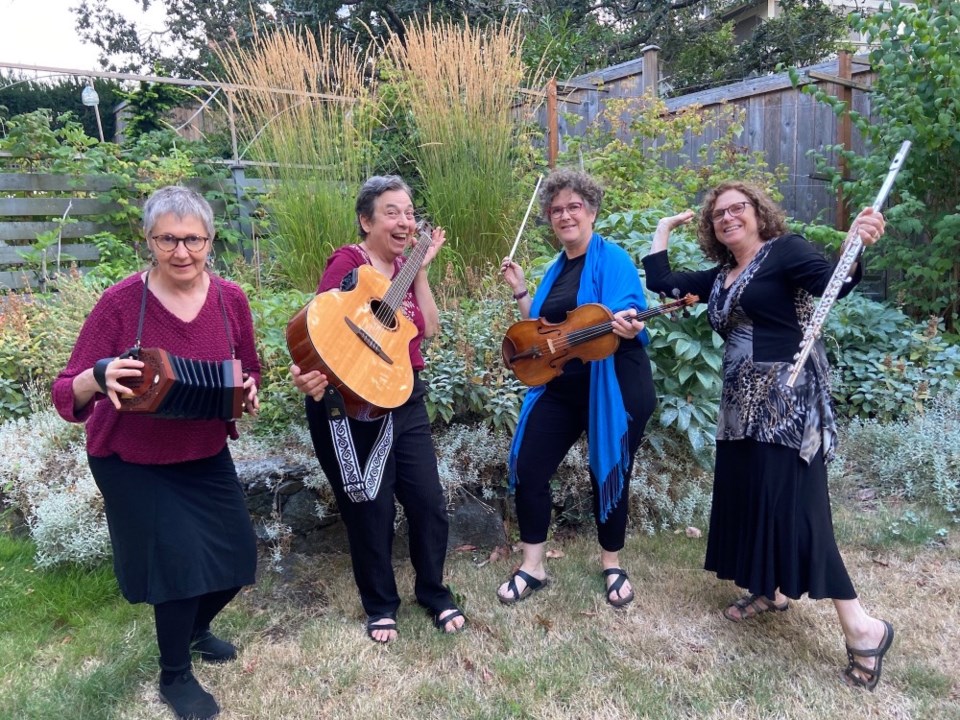For many people, spirituality means belief in God and religious participation. The late humanistic Jewish thinker Yaakov Malkin offered a non-theistic definition.
“The desire for spirituality – in the sense of a dimension to life extending beyond the rational, a life dense with profound experiences – manifests itself in love, art and faith,” Malkin wrote in his 2004 book “Secular Judaism: Faith, Values, and Spirituality.”
He meant a love for people and community, a faith that people “are capable of the sublime,” and art that reveals “the heights human beings are capable of reaching.”
And if a community gathers for a concert that reaches across generations in pursuit of the sublime?
An estimated 150 people attended the debut concert of Kvell’s Angels on Oct. 1 at the University of Victoria’s Means Centre for Learning in the McPherson Library. In “A Trampled Manuscripts Concert: The Lost Klezmer Music of the An-ski Expeditions,” the local quartet introduced to Victoria 14 of some 1,400 klezmer tunes that had been unseen for more than a century.
Klezmorim (Jewish musicians) had performed these songs during the early twentieth century. Much of that music was memorized but not notated – until folklorist Zinovy Kiselgof and colleagues traveled through the Belarus and Ukraine from 1912-1914 as part of a Jewish ethnomusicological expedition organized by folklorist S. An-ski.
The hand-notated songs eventually were preserved in the Vernadsky National Library of Ukraine in Kiev along with fiddler Avrom Makonovetsky’s handwritten notebooks of klezmer wedding tunes.
This trove of traditional Jewish music was inaccessible to klezmorim and scholars until 2017, when a Japan-based scholar visited Kiev and received permission to copy photos of pages from several of the notebooks.
The Klezmer Institute, a Jewish cultural organization, became involved, creating the Kiselgof-Makonovetsky Digital Manuscript Project (KMDMP) to distribute copies of the manuscripts online. Researchers, instrumentalists and singers – including Canadians – have transcribed the material into a playable, sharable format.
As the Kvell’s Angels formed this past summer, violinist Amy Paster wanted to play new repertoire and was drawn to the KMDMP manuscripts, according to flutist Julia Herzog.
Herzog recently completed a Ph.D. in UVic’s School of Child and Youth Care with support from the Holocaust Studies program, she said, particularly Professor Charlotte Schallie, and from Dr. Matthew Huculak, a UVic digital scholarship librarian.
To celebrate, the flutist approached Schallie “about putting on a concert or festival, a celebration of Yiddishkeit [Ashkenazic Jewishness] – and the result was this” performance, she explained.
Schallie said UVic’s Department of Germanic and Slavic Studies, home to the graduate Stream in Holocaust Studies, was honoured to co-host an event that “illuminates the richness, vibrancy, and diversity of late-nineteenth and early-twentieth century Jewish culture in Eastern Europe.”
The Kvell’s Angels spoke during interviews of connections to the music that author Malkin likely would have considered spiritual.
Guitarist Lucy Nerenberg said she feels “like an archeologist is dumping off these amazing, varied artifacts that are key to trying to imagine sounds coming from under the fingers of these musicians from over a hundred years ago and the community surrounding them.”
Concertina player Laura Rosenberg added that “through this project I feel newly connected to a global network of musicians and musicologists who digitally notated these old manuscripts during the first part of the pandemic lockdown.”
For Herzog, the music restores a heritage of Yiddishkeit. “An-ski was apparently motivated by his awareness of the threats the Jews faced in Eastern Europe through the frequent violent attacks – the pogroms – on villages,” she noted. “An-ski couldn’t know that he was preserving music, stories, and artifacts from his community, the Jews of Europe, soon to face genocide.”
Andrew Muchin is a member of the Victoria Jewish Culture Project, a graduate student in public history at the University of Victoria, and host of the “Sounds Jewish” radio program available at PRX (https://exchange.prx.org/series/32262-sounds-jewish).
You can read more articles on our interfaith blog, Spiritually Speaking at https://www.timescolonist.com/blogs/spiritually-speaking
* This article was published in the print edition of the Times Colonist on Saturday, Oct 7th 2023



